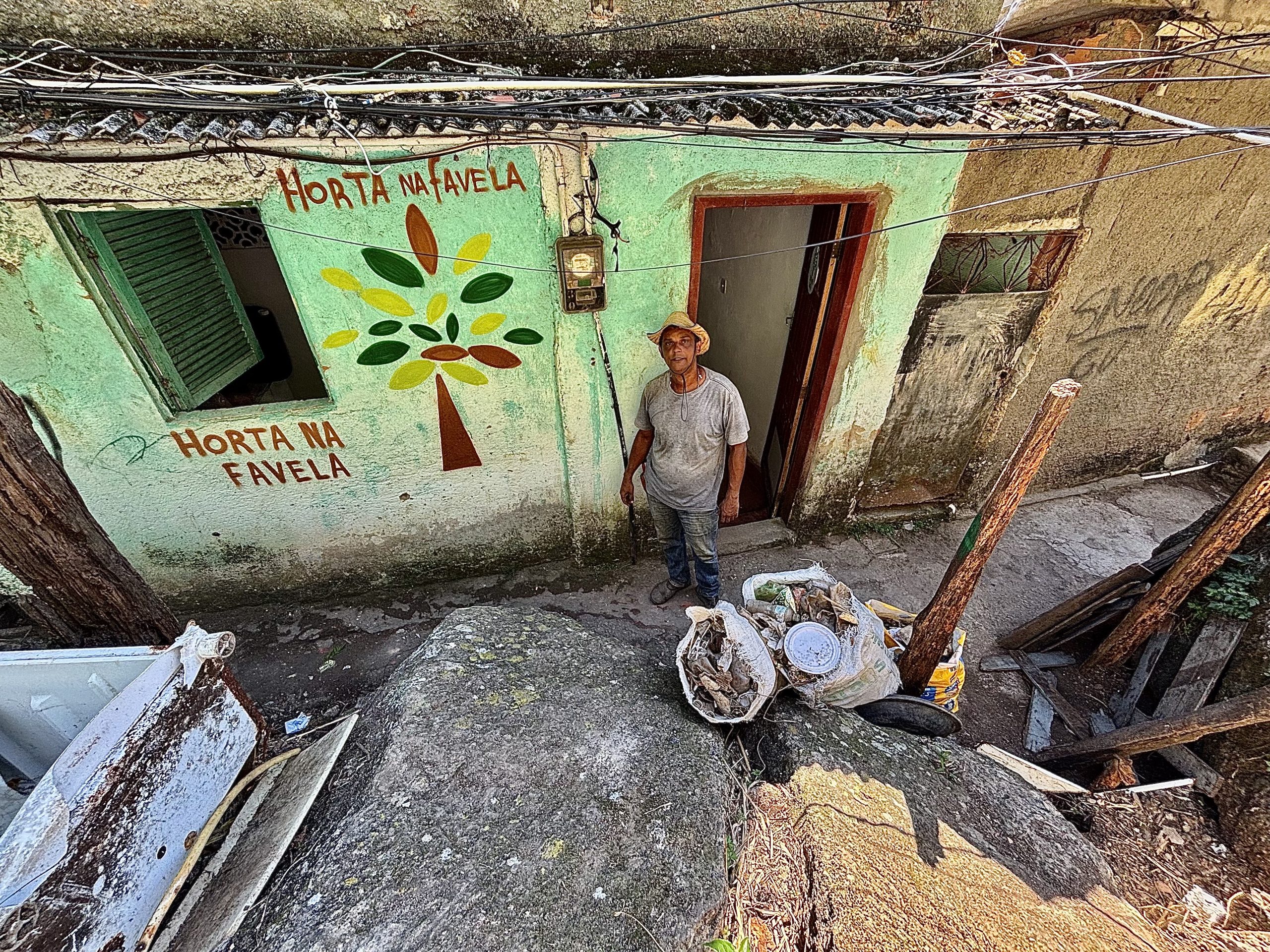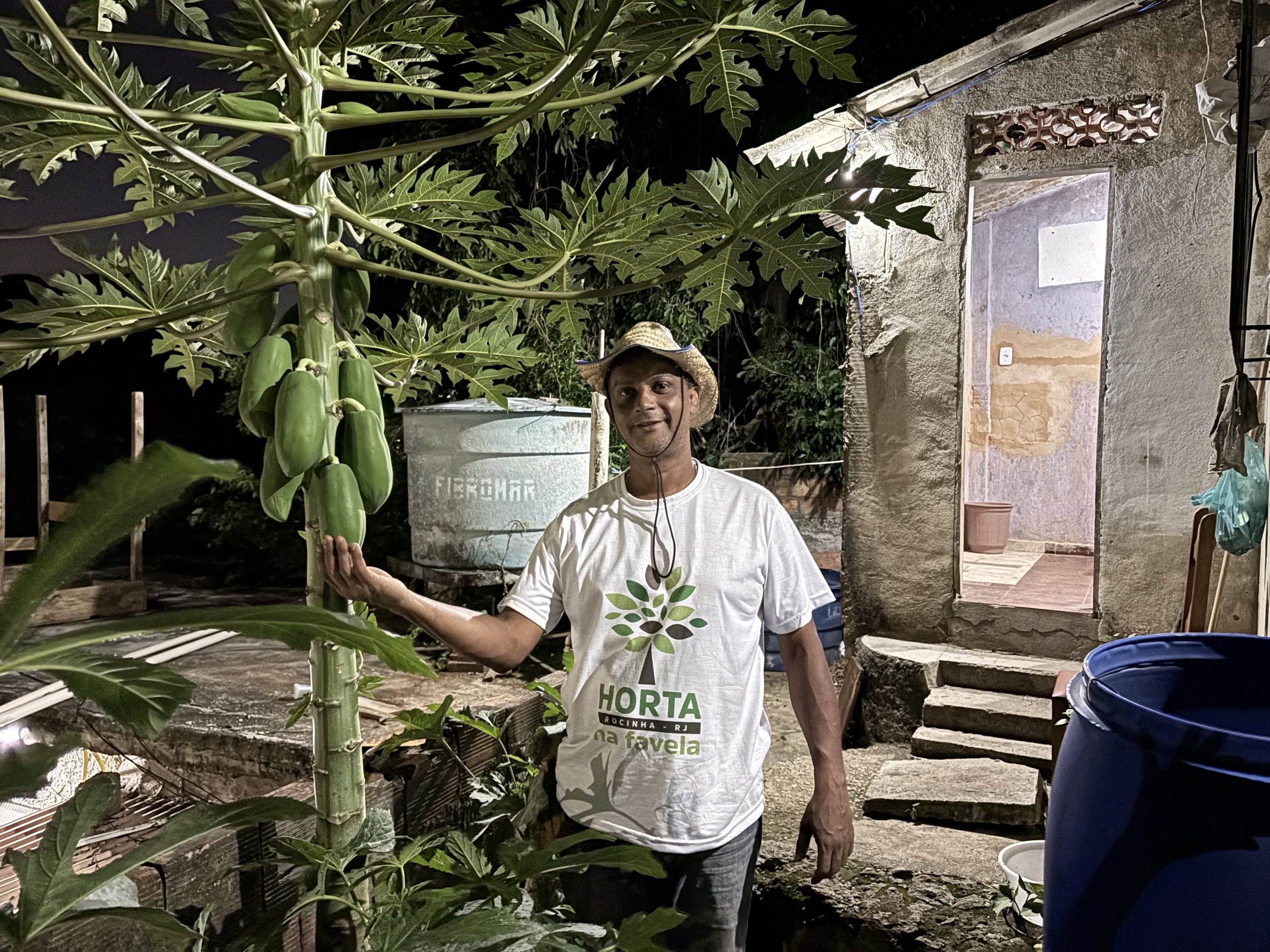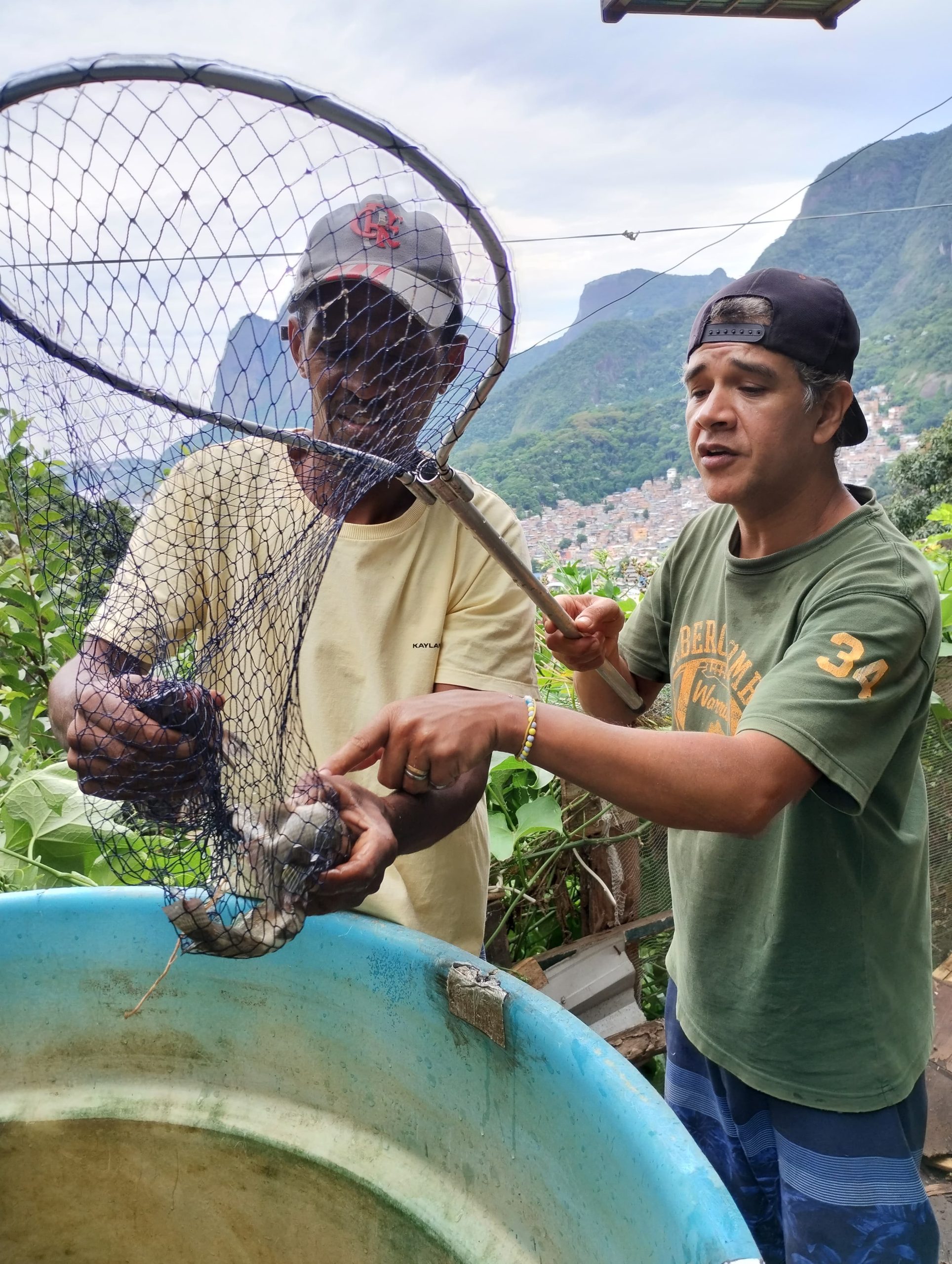For the original article by karen fontoura published in speech garden, click here.
Arriving at Terreirão Rua 1, at the Top of Rio de Janeiro’s Rocket favela and near the Pedra do Morro Dois Irmãos (Two Brothers Mountain, an iconic rock formation with breathtaking views of the city), there is a clear movement for environmental preservation. It is the Garden in the Favela project, an initiative created by Flávio Gomes, a 50-year resident of the community. The project combines urban vegetable gardening in small spaces, forest clean-ups and raising fish in tanks.
In November 2025, Brazil will host the 30th United Nations Conference of Parties (COP30) In Belém, To statein the heart of the Brazilian Amazon. This global event brings together nations to discuss and negotiate measures to combat global warming and climate change. But Flávio Gomes’ example shows that it is already possible to live in a sustainable favela and fight hunger with knowledge and a little investment.
“If I had the knowledge I have today, maybe my family wouldn’t have been featured in the newspaper as the poorest family in Rocinha in 1979. Much of the poverty we experienced back then was, in part, due to a lack of knowledge about food,” Gomes recalls, moved by the memories of a childhood lived in social vulnerability.
At the project’s headquarters—a rented space—it is common to find Gomes with his hands in the soil, wearing a straw hat as he prepares the ground to cultivate edible plants. With creativity, he and his brother transform what would be garbage into structures for food production: using discarded refrigerators, buckets, water tanks, bottles and other recyclable materials collected from the forest to build garden beds, tanks for raising tilapia, and compost bins that produce nutrient-rich soil.

“One of my dreams is to see Rocinha regain its agricultural identity and be what it once was: a big ‘roça’—a farm where residents grew their own food and sold it at local fairs and markets.” — Flávio Gomes
He believes this knowledge can also become a source of income for those living in the favela. According to a 2023 survey by the Pereira Passos Institute on Social Territories in the 10 Largest Favela Complexes, around 5,328 families in Rocinha face food insecurity. The study interviewed 24,000 residents and found that 3,861 families live in extreme poverty.
Aware of this reality, Gomes decided to study agroecologyfish farming and meliponiculture—the practice of raising stingless bees—to develop a sustainable model of food production in the favela. He learned that tilapiaa freshwater fish species popular for its rapid growth and easy adaptation to different environments, can thrive in rooftop water tanks. Tilapia is an excellent source of protein and nutrients and is widely consumed in many culinary traditions.
Gomes continues to work on strengthening collective awareness about proper solid waste disposalencouraging reuse, and inspiring residents to transform their own spaces. However, he does acknowledge that the exhausting routine of most residents—often working six days a week with a single day off—makes it difficult for them to connect with the soil.

For this reason, Gomes hosts workshops to share what he has learned in courses, offering practices for everyday life. “I just planted a cashew tree here, and I also want to plant my jabuticaba tree. The roots help keep the soil in place and prevent landslides,” he explains, showing that sustainability begins with caring for the community.
Sustainability and Money in Your Pocket
The area where the project operates is located in the Tijuca Massifnear the Tijuca National Parka preserved forest region surrounding Rocinha. Amid the lack of basic sanitationirregular waste disposal, and limited access to healthy food, the initiative offers a concrete and inspiring response.
Today, three families in the favela already maintain their own tilapia tanks with support from the project. The process, according to Gomes, is simple but requires dedication. “Many residents can adapt the model to their homes,” he says.
During Holy Week in April, a resident sold R$630 (~US$116) worth of tilapia to friends, showing the initiative’s potential to generate income In Rocinha.
“And Alexandre even caught fish for his family—for his mother and siblings,” Gomes recalls. He explains that with about R$1,000 (~US$184), a resident can buy the materials needed to build a tilapia tank. And the best part? If they use materials discarded in the forest, the cost is even lower. “We already have the knowledge and the will! There are about four residents who want to set up tilapia tanks, but they just don’t have the money to invest.”

According to data from the Access to Information Act, 8,293 families in Rocinha were receiving Family Bolsa benefits in May 2024. This government program is essential for the fight against hunger in the favela. However, not everyone who needs the benefit is able to access it, which underscores the importance of autonomous, community-driven initiatives like Gomes’.
Lucilene Ribeiro, 34, also a resident, wants to set up a vegetable garden at home to grow her own food: “The kids are already saying they’ll help him [Gomes] and see how to make a garden at home. Even I’m looking for some pots to put up here [on the wall] so I can grow my own food.”
Even with all this community engagement, the project has still not received financial support. It has had to move its headquarters after the rented house where it was based was sold.
The new headquarters is currently being renovated to host local school groups as well as community leaders interested in spreading the project’s knowledge. “Having sponsors would give us an extra boost. We could pay residents who are already working with us, and that would allow everyone to dedicate themselves more. Not having to worry about the monthly bills alone would create many new opportunities,” Gomes emphasizes.
Did You Know?
Agroecology: the study of how to grow food and care for the soil in a natural way that respects the environment. In practice, it means making vegetable gardens using organic fertilizer, reusing food scraps, and planting without pesticides—much like people used to do in the past.
Fish farm: fish farming, the practice of raising fish. In Gomes’ case, he raises tilapia in water tanks, which helps produce fresh, healthy food right in the favela.
Meliponiculture: the raising of stingless bees. These bees help pollinate plants—allowing them to bear fruit—and also produce honey, which can be eaten or even sold.
Composting: the process of transforming food scraps—like fruit and vegetable peels—into natural fertilizer. Instead of being thrown away, these scraps become nutrient-rich “good soil” for planting. Beyond reducing waste, composting helps care for plants and the environment.
Non-conventional Edible Plants (Ancestral PANCs): these are neither a trend nor mere ingredients of alternative cuisine. They are foods that have always existed in Black, Indigenous and peripheral areas, as taught by Brazilian activist and quilombola leader Nêgo Bishop. They grow in our backyards and often go unnoticed, yet they have always been present in our grandmothers’ cooking, at street markets, and in the hands of those who know they offer a wide range of flavors, textures and nutritional benefits. They may be the key to enriching your diet and ensuring your family’s food security—while rooting the future in ancestral knowledge. You might even have PANCs at home… and don’t even know it! (With information from @brunacriola and Invivo – Fiocruz’s Museum of Life).
About the author: Karen Fontoura is a journalism student at the Federal University of Rio de Janeiro (UFRJ), a resident of Rocinhaand a reporter with community newspaper Roçawhere she coordinates the organization’s institutional and project communications. She works with audiovisual production, reporting and the promotion of community initiatives.


